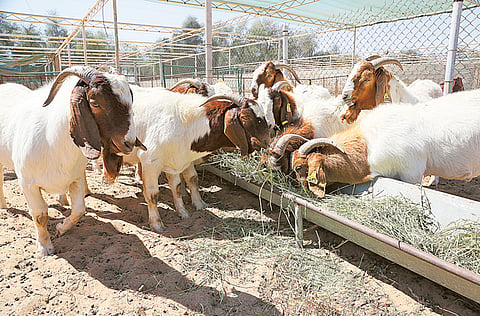Breeding programme for 3.3m goats and sheep in Abu Dhabi farms
Programme to improve quality of local lamb and mutton

Abu Dhabi: The quality of locally produced lamb and mutton in the Abu Dhabi market is expected to improve with a new breeding programme for livestock farms introduced by a government organisation.
The livestock farms in the emirate with around 3.3 million goats and sheep will improve their efficiency with the programme, a senior official said.
Two breeds of sheep and one breed of goat from Australia that would be compatible with the local population will be introduced in the local farms for breeding, Christopher Hirst, Chief Executive Officer of Abu Dhabi Farmers’ Services Centre (ADFSC), said.
Fifty such sheep and goats have already been distributed to 50 farms that have joined the programme in the first cycle, he told Gulf News on the side-lines of a press conference.
A breeding programme cycle in a farm may continue for three to four months, Hirst said.
The centre asked farmers to register for the programme and selected farms from that list in Al Ain, Abu Dhabi and the Western Region according to a set criteria. More farms will be selected to expand the programme.
The breeding system is rotational, which means the breeding males will remain at the farm for a specified period before moving to another farm. This will ensure the maximum benefit for the largest number of farmers with the fewest number of breeding males.
The programme also aims to encourage integrated farms that will effectively recycle all farm by-products.
Abu Dhabi emirate has around 24,000 farms and many of them joined ADFSC as members to receive support and guidance in farming. The total number of farms rearing goat and sheep was not readily available.
The question remains whether the programme will increase the number of sheep and goats and thus the production of meat.
“Increasing the quantity is not the aim of the programme at all. It aims to improve the overall efficiency of the goat and sheep farms,” Hirst said.
Farmers have to sign a contract with ADFSC to join the breeding programme that will offer guidance, training and supervision for farm workers, he said at a press conference.
Sheep and goat are capable of multiple births under a well-managed system, however, that requires targeted nutrition, good flock health, and clean and well-shaded housing with adequate water and feed.
The programme will help farmers to improve farming practices.
The imported breed of goat and sheep are not new to the region. They will be compatible with the local population.
The programme follows the ADFSC’s initiative to sell locally produced fresh lamb, veal and chicken at prominent retail chains.
Customers found local produce attractive because of the good quality and freshness as they are not transported long distances, the centre had told Gulf News earlier.
They are not cheaper because the production is not commercial (large scale) but from small farms. In many countries, meat and chicken are produced on a large scale in big farms, which minimises production costs.
The centre’s initiative is relevant in the wake of demands from environmentalists to have people move to locally produced food that minimises the carbon footprint caused by transportation. The carbon footprint is the amount of carbon dioxide or other carbon compounds released into the atmosphere as a result of the activities of a particular individual, organisation, or community.
Food transportation contributes to a huge amount of carbon emissions worldwide.
The initiative is also important for food security of the UAE as the country imports more than 85 per cent of its food.
The centre started selling the local meat and chicken through its own souqs across the emirate by late 2012 and through major retail chains in mid-2013.

